On and Off the Hill
Marlboro and Emerson Sign Agreement
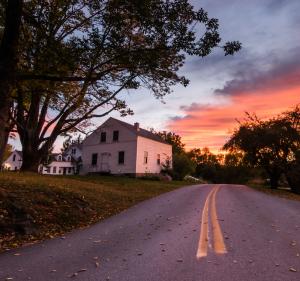 In May, the Marlboro and Emerson College Boards authorized negotiating and signing a binding agreement to form the much anticipated alliance that the two schools have worked so hard to develop over the last several months. This agreement was signed recently by Lee Pelton, Emerson president, and Kevin Quigley, Marlboro president, and is currently being reviewed by the Office of the State Attorney General’s Office for final approval.
In May, the Marlboro and Emerson College Boards authorized negotiating and signing a binding agreement to form the much anticipated alliance that the two schools have worked so hard to develop over the last several months. This agreement was signed recently by Lee Pelton, Emerson president, and Kevin Quigley, Marlboro president, and is currently being reviewed by the Office of the State Attorney General’s Office for final approval.
"Given our strategic approach and deliberative process over the past few years, we expect that this transaction will be eventually approved," says Kevin Quigley. “Our faculty continue to prepare for this important transition, and we are very pleased that many of our students will be following them to Boston. We want to especially acknowledge the work of the joint faculty working group, involving both Emerson and Marlboro faculty, whose work will help ensure that Marlboro's pedagogy will endure at the newly named Marlboro Institute for Liberal Arts and Interdisciplinary Studies at Emerson College.”
The Marlboro Institute provides positions to all of Marlboro's tenure and tenure-track faculty, and 20 of these 24 faculty are going. It also offers admissions to all of our students, keeping tuition at the Marlboro level and maintaining financial aid. The Marlboro Institute curriculum incorporates the Marlboro Promise and includes essential elements of the Marlboro education experience such as clear writing, a Marlboro seminar each year, a senior year capstone with elements of Plan, and outside examination. NECHE, the regional accrediting body, has already approved Emerson’s request for these substantive changes to enhance the Marlboro Institute at Emerson.
Following a very successful student visit to Emerson in February, and continued support for making this transition, 53 students have said they will be moving to Emerson from Marlboro. In addition, Emerson has had 12 new students deposit for the Marlboro Institute, some of them who initially applied to Marlboro College for 2020 and others who applied directly to Emerson. These numbers hold some promise that the newly named and expanded institute will grow and thrive. For students who were not continuing on to Emerson, Marlboro was able to negotiate five transfer agreements with other colleges, with the same tuition at the same level, including three in Vermont.
There were countless individuals who played a vital role in forging the Emerson relationship. In typical Marlboro fashion, this has been a community effort involving students, faculty, staff, alumni and trustees, as well as members of the extended community. Marlboro was also greatly supported by colleagues at Emerson who have demonstrated an unwavering commitment to continuing Marlboro’s mission, vision, and relevance on their campus, in spite of the enormous challenges to higher education during this COVID-19 pandemic.
“We recognize that all of us would prefer that Marlboro College remain as is on our beautiful campus in the foothills of the Green Mountains,” continues Kevin. “We are, however, very fortunate to have found a path that both continues our distinctive liberal arts mission at Emerson and offers an opportunity for an innovative, mission-driven education program to take root here on the Hill.”
Campus To Go to Democracy Builders
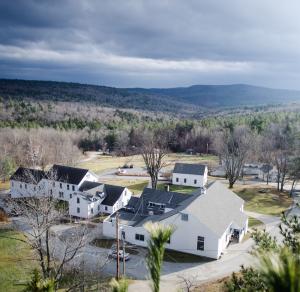 In response to community members concerned about the future of the Marlboro campus, the Campus Working Group made every effort to find another educational institution would build on the foundations that Marlboro College has so carefully laid. In June, the college signed a binding agreement on the sale of the campus to Democracy Builders, a non-profit organization that will launch an innovative new model of higher education dramatically improving outcomes for low-income and first generation college students. Like the Emerson alliance, this agreement is being reviewed by the Office of the State Attorney General’s Office, and is expected to be approved.
In response to community members concerned about the future of the Marlboro campus, the Campus Working Group made every effort to find another educational institution would build on the foundations that Marlboro College has so carefully laid. In June, the college signed a binding agreement on the sale of the campus to Democracy Builders, a non-profit organization that will launch an innovative new model of higher education dramatically improving outcomes for low-income and first generation college students. Like the Emerson alliance, this agreement is being reviewed by the Office of the State Attorney General’s Office, and is expected to be approved.
Pending state regulatory and accreditors’ approval, Democracy Builders’ “Degrees of Freedom”program will offer a hybrid degree that will bring cohorts of students to the campus for multiple residencies. Democracy Builders was chosen above all other proposals by the Campus Working Group (CWG), and trustees unanimously followed their recommendation.
“We are reimagining higher education, not tinkering around the edges,” said Seth Andrew, founder and CEO of Democracy Builders and founding president of Degrees of Freedom, as quoted in the Brattleboro Reformer. He believes the new model will “revolutionize the design and structure of college while bringing new energy to the beautiful hills of southern Vermont.” This new model, he said, is “a more nimble, personalized, and career-targeted model of higher education that aims to yield dramatically better outcomes for our students.”
Democracy Builders founded Democracy Prep, a network of 20+ high-performing public schools throughout the U.S. committed to educating citizen-scholars who are well-prepared for success in college and citizenship. Degrees of Freedom is born out of work with 10,000 K-12 students and, pending state approval, will create a wholly integrated path to a degree for students from hundreds of similar schools across the nation. The Degrees of Freedom model will also continue Marlboro’s self-governing tradition through bi-weekly town hall meetings similar to those already in place at Democracy Prep.
It will be a reassurance to many community members that the impressive academic and democratic legacy of Marlboro College is one factor that makes the location exciting. “It is a legacy of academic rigor and independent study that we are very passionate about,” said Andrew. “We believe passionately in democracy and right now it’s in jeopardy and needs a lot of support. We want to produce citizens who are prepared to function in our democracy, just as Marlboro College did.”
Read the Brattleboro Reformer article.
Marlboro Responds to Coronavirus Crisis
Like every college or university in the United States, indeed around the world, Marlboro faced immense challenges this spring semester because of the emerging COVID-19 outbreak, ultimately a global pandemic. Starting with baby steps just before spring break, the college’s response would ultimately result in shutting down the campus for the rest of the semester, a move that took speedy and proactive efforts on several fronts.
On March 19, most staff began to work remotely and Vermont Governor Phil Scott ordered all non-emergency, non-essential individuals to stay at home the following week. Even seniors who were staying on campus to complete their Plans were only able to stay until March 22. Instead of returning to campus after spring break on March 29, all students and faculty began engaging in online classes and tutorials with support from the IT department.
“Like any other year, this was the time to start the exhilarating and always fascinating race to finish the semester,” said President Kevin Quigley. “Witnessing the flowering of senior Plans leading up to commencement remains one of the great joys of being a part of the Marlboro community. This year felt very different, but held the same promise for academic accomplishment and closure for these students.”
Despite the challenges, classes and tutorials met at their usual times using online platforms, and advisors, staff, and student tutors continued to support students and help them make the most of this transition to remote learning. Student life staff remained vigilant to the needs of students, providing virtual programming like movie and game nights, workshops, shared meals, and other ways to stay connected. The Outdoor Program continued to encourage ways to get outside and stay healthy, in mind and body, during this challenging time.
The college even took positive role in the local community, donated masks and other personal protective equipment from the Total Health Center to the Springfield Medical Care system, Brattleboro Memorial Hospital, and local first responders. Additionally, the college worked with Metz, our food service company, to distribute the remaining food from the dining hall to local organizations, including the Marlboro Community Center, Chester Helping Hands, and local food shelves, to help feed those who found themselves food insecure.
The timing could not be much worse, of course, as the COVID-19 crisis was coupled with the imminent Emerson alliance to make for a very difficult end-of-year transition for the campus community. Despite all of these challenges, the community generally—and especially graduating seniors—demonstrated the very best of Marlboro’s spirit of resilience and creativity.
Archives Find a Home at UVM
 In the wake of Marlboro College’s alliance with Emerson College, one of the outstanding concerns of community members has been the future of archives housed in Rice-Aron Library, including the Plan Room housing decades of original student work. There were concerns about these valuable artifacts leaving Vermont, or being inaccessible to those interested in exploring Marlboro history. In June, the college was pleased to announce that their archives and special collections would be going to the University of Vermont, where they will be carefully curated and made publicly available into the future.
In the wake of Marlboro College’s alliance with Emerson College, one of the outstanding concerns of community members has been the future of archives housed in Rice-Aron Library, including the Plan Room housing decades of original student work. There were concerns about these valuable artifacts leaving Vermont, or being inaccessible to those interested in exploring Marlboro history. In June, the college was pleased to announce that their archives and special collections would be going to the University of Vermont, where they will be carefully curated and made publicly available into the future.
“We are thrilled to have our invaluable archives going to UVM, where they will join historic collections from several other Vermont colleges,” said Kevin Quigley, Marlboro president. “As an urban campus, Emerson College does not have the capacity for our extensive collections to remain a public resource, and it has been extremely important to many in our community that the collections remain in Vermont, with easy access.”
“I’m very pleased Marlboro’s archives are staying together and heading to UVM, where they will be well cared for by a team of archival professionals and made available to interested researchers,” added Amber Hunt, interim library director. As part of the agreement, the collections will remain open to the public for use.
One of the most valuable parts of the Marlboro College archives collection is more than 2,500 Plans of Concentration submitted by graduating students and spanning from the early 1950’s to present day. These remarkable works represent the range of creative and scholarly exploration by Marlboro students over the years, and remain the clearest legacy of the college’s student-centered pedagogy. Each Plan is professionally bound and cataloged, including digital copies, and the copyright for each remains with the alumni authors.
The collection also contains a variety of other materials, including college catalogs and handbooks, The Citizen student newspaper, Potash Hill magazine, yearbooks, scrapbooks, and historical college ephemera. It includes documents from the college’s early history, and recordings from campus events including concerts featuring notable musicians such as Blanche Moyse and speakers like Loren Pope and Saul Bellow. There are also oral histories of alumni from the college’s first few graduating classes, faculty and alumni publications, and photographs of campus life dating back to the mid-1940s and continuing to the present time.
“The University of Vermont’s Silver Special Collections Library is pleased to be able to provide a home for the Marlboro College archives,” said Chris Burns, curator of manuscripts and university archivist. “Marlboro’s legacy of a high quality, small-scale, egalitarian, and individualized approach to education will continue to live on in the college archives that will be preserved and made accessible at the University of Vermont. Our special thanks go to our friends at the Marlboro College Library who collected and organized these records over the years.”
“At a time when small colleges in Vermont—and indeed across the country—are struggling to exist, we can’t underestimate the importance of protecting our invaluable archives in perpetuity,” said President Quigley. “While other colleges have been forced by economic expediency to auction off or abandon their collections, Marlboro College is very pleased and grateful that UVM will be providing an appropriate home for these historic resources.”
Events
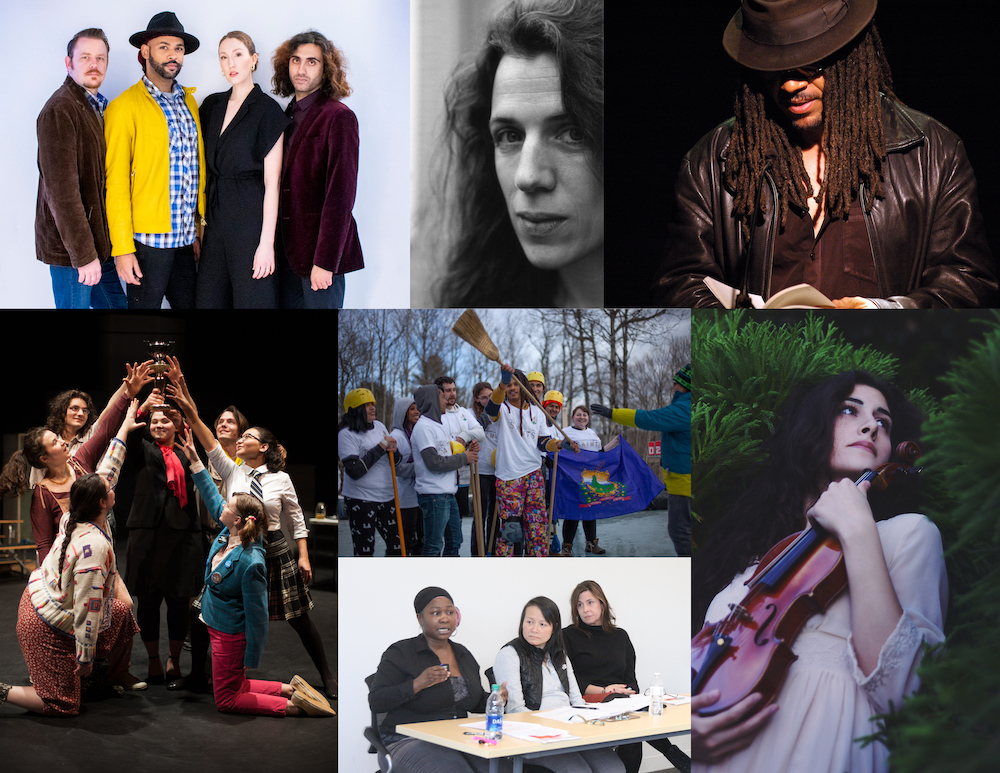
Although the spring semester on campus was short, it was action-packed. Highlights include, clockwise starting with top left: A Night of Music with Felix Jarrar ’16 and vocalist colleagues featuring a recital of his art songs for voice and piano including the world premiere of his cycle “The Ulster County Songbook”; a reading by acclaimed poet Sophie Cabot Black ’80, called “a poet’s poet” by National Public Radio; “Literature as Resistance,” a conversation with award-winning author Michael Datcher, with music by Rodney “Don” Chapman; A Music for a Sunday Afternoon concert by Layale Chakar and her ensemble Sarafand, featuring the Lebanese violinist’s unique blend of contemporary, jazz, and Arabic Maqam music; a panel discussion on racial bias titled “What is ‘Woke,’ and are you it?” featuring Shanta Lee Gander, Julie Pham, and Jenna Chandler-Ward ’92; The 25th Annual Putnam County Spelling Bee, a musical comedy directed by Emily Weatherill and Izzy Swarbuck; and perhaps the final annual broomball tournament featuring competitive teams from the alumni community as well as faculty and staff.
Also of Note
In March, just as the campus was poised to close for spring semester, and ultimate for the semester, Alta Millar ’20 (pictured right) pulled off a public performance of her Plan work-in-progress in the Serkin Center Dance Studio. Working with her improvisational dance collective, which included Karla Julia Ramos ’20, Minno Zelkin ’20, Sarah Cyr ’21, and Charlie Hickman ’20, Alta aspired to create a space “where desired futures are alive in the moment, difference is utilized, and (re)actions are questioned.” Alta’s Plan of Concentration “generates, suspends, and propels mechanisms for change-making through the sensorial experience of improvisational movement.”
In February, four Marlboro students accompanied sociology professor Jennifer Girouard to the annual Eastern Sociological Society (ESS) Conference in Philadelphia, where they presented on their Plan work during a poster session. Cyane Thomas ’20 presented a poster titled “Cross-Cultural Unity or Division: Analysis of Fans within the Korean Pop Music Subculture,” and Drew Daniels ’20 presented his on “The Effects of Active Co-Creation within the Burning Man Community.” Grace Hamilton ’20 presented her work on “Navigating Privilege and Difference in Human Service Work,” and Sage Kapitsis ’20 explored“Expectation Differences Between School- and Nonprofit-Education. The group shared their posters and their experiences at the conference with Marlboro community members in March, and were well-received!
Film and video studies professor Brad Heck ’04 had the world premiere of Sisters Rising, the film he made with Willow O’Feral ’07 (see Alumni News), in February at Big Sky Documentary Film Festival, where it earned an honorable mention. Sisters Rising is the story of six Native American women fighting to restore personal and tribal sovereignty in the face of ongoing sexual violence against indigenous women in the United States. It’s an urgent call to action, a gorgeous portrait of powerful women acting in solidarity, and a demand for self-determination as the necessary step towards ending violence against Native women. Learn more at sistersrisingmovie.com.
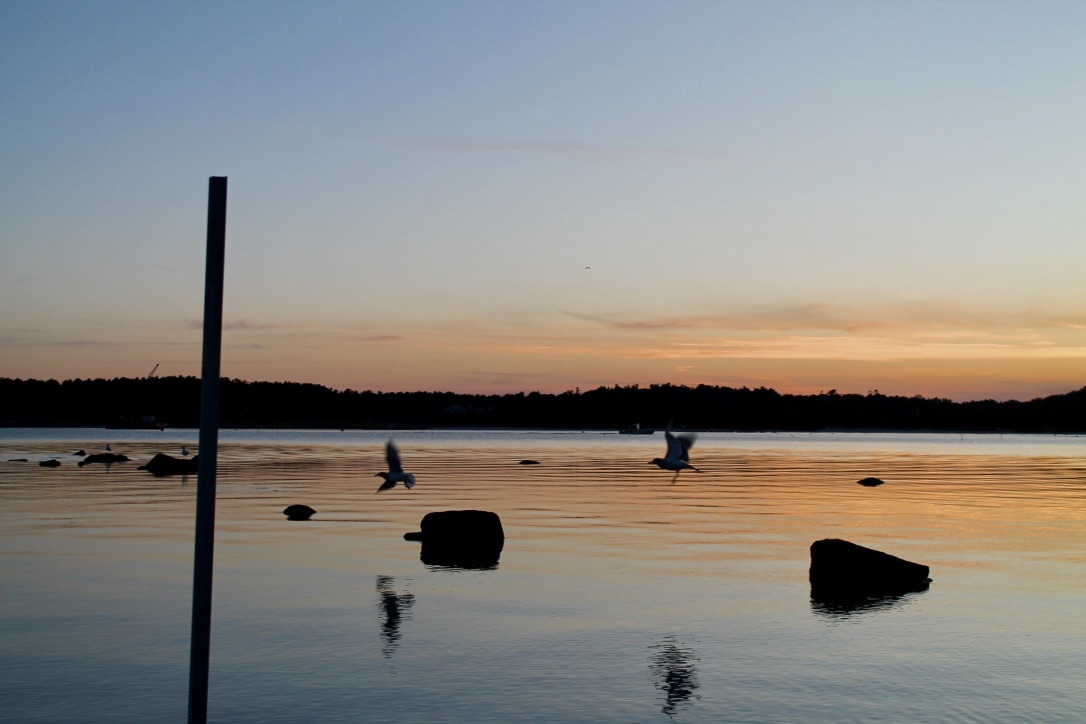 In May, students and faculty shared their written work in an online reading celebrating the work of graduates and sadly saying goodbye, sponsored by creative writing and literature professor Bronwen Tate. Readings included poetry by Lydia Nuhfer ’20, Anna Morrissey ’20, Raph Cornel ’20, Maya Faerstein-Weiss ’20, Nick Creel ’20, Bronwen Tate, Jac Clark ’95, MSM ’14, anthropology professor Nelli Sargsyan, and Daniel Medeiros ’19, fiction by Roan Lee-Plunkett ’20, Sophie Gorjance ’16, and Kristen Thompson ’19, and a personal essay by Jadian Bryan ’20. See the whole reading.
In May, students and faculty shared their written work in an online reading celebrating the work of graduates and sadly saying goodbye, sponsored by creative writing and literature professor Bronwen Tate. Readings included poetry by Lydia Nuhfer ’20, Anna Morrissey ’20, Raph Cornel ’20, Maya Faerstein-Weiss ’20, Nick Creel ’20, Bronwen Tate, Jac Clark ’95, MSM ’14, anthropology professor Nelli Sargsyan, and Daniel Medeiros ’19, fiction by Roan Lee-Plunkett ’20, Sophie Gorjance ’16, and Kristen Thompson ’19, and a personal essay by Jadian Bryan ’20. See the whole reading.
“The unifying theme of this Plan of concentration lies at the intersections of race, identity, and culture,” says Ricarrdo Valentine ’20, who completed a Plan in dance and photography titled “Shaping Afro-Neo Narratives: Bailar y Fotos (Dance and Photos) in Afro-México.” “It’s a collaborative examination of (re)claiming and (re)connecting with diasporic siblings in North America specifically in and between Veracruz, México.” Ricarrdo used oral history, autoethnography, and cross cultural dance exchange to engage with collaborators in Veracruz. “This connection through our shared African descendant heritage helped me to reveal the commonalities and differences that emerge in the (re)claiming process of a displaced marginalized group.” Explore Ricarrdo’s work at facebook.com/bhooddance/.
Like many graduating seniors, Jenny Stofer ’20 struggled with how to share her final work, which was completed in a secluded makeshift studio at home. She made her Plan in visual arts and philosophy, titled “Thinking with Others: Explorations in Philosophy and Painting, available on a Wordpress site. Jenny said, “My Plan was a process of closely examining the works of artists, both professionals and the ones in my lineage, and scholars of critical theory, moral theory, and others, and clarifying my own questions in relation to their work. My paintings, drawings, and writings are a realization of this goal.” Find Jenny's Plan work at jennystofer.com.
 In May, creative writing and literature professor Bronwen Tate’s next book of poetry was selected as the national winner of the Hillary Gravendyk Prize. The Silk that Moths Ignore, “chronicles both loss and joy in its peculiar, sensual language, all the while keeping its focus on the mind’s movement as it tracks that which is beyond or below attention,” writes Jessica Fisher, one of the judges. “Here is a poet who ignores nothing, whose description brings us into the immersive space of experiences that are not ours, but are nonetheless felt fully. The lived and the linguistic find a common articulation in this work, given that the ‘tongue is word and taste;’ this is an exhilarating and perceptive book which values, as does Hillary Gravendyk’s own indelible work, the homes we make within both nature and language.” In addition to $1000 the prize includes a publishing agreement, with a scheduled 2021 release.
In May, creative writing and literature professor Bronwen Tate’s next book of poetry was selected as the national winner of the Hillary Gravendyk Prize. The Silk that Moths Ignore, “chronicles both loss and joy in its peculiar, sensual language, all the while keeping its focus on the mind’s movement as it tracks that which is beyond or below attention,” writes Jessica Fisher, one of the judges. “Here is a poet who ignores nothing, whose description brings us into the immersive space of experiences that are not ours, but are nonetheless felt fully. The lived and the linguistic find a common articulation in this work, given that the ‘tongue is word and taste;’ this is an exhilarating and perceptive book which values, as does Hillary Gravendyk’s own indelible work, the homes we make within both nature and language.” In addition to $1000 the prize includes a publishing agreement, with a scheduled 2021 release.
In May, film students presented their final works in an on-line film festival hosted by film and video studies professor Brad Heck ’04, and including work by Sam Harrison ’20, Merlin Katz ’20, Veronica Sherman ’20, Deana Seitz ’20, and David Teter ’20. It included a work-in-progress narrative film by Merlin, and involving most of those students and several others, called Hilbert the Bunny, a story of love, loss, and imaginary fauna. “My Plan examines and exemplifies the depiction of imagination in film,” says Merlin. “I write and produce a short film that utilizes elements of magical realism to illustrate a state of mind that cannot be conveyed through conventional acting or coverage, specifically to show how the imagination interacts with one's surrounding environment.” The festival also included a short film by Sam, whose plan to document the last semester at Marlboro (see Potash Hill Spring 2020) was curtailed by the coronavirus crisis. See Reflections on the Last Semester of Marlboro College.
Commencement 2020
This year’s commencement was exceptional in so many ways, not only because it was the final one on the Potash Hill campus. Although the coronavirus pandemic prevented the college from holding in-person commencement ceremonies and other activities, the graduating class of 2020 was celebrated by a commencement video, which they were able to enjoy with their family and friends. This on-line solution was developed in response to feedback and suggestions from graduating students, and captures the spirit of an in-person ceremony with speeches, music, and multimedia displays illustrating student accomplishments. The students simultaneously received a package from the college with their regalia, diploma, and other items to help them celebrate with their loved ones. See the whole commencement video.
From the remarks of President Kevin Quigley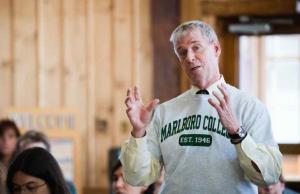 Thinking about the arc of your lives, I am reminded that you have been through so much to get to this moment… and everyone in the Marlboro community is very proud of you. Your lives have been shaped by the September 11, 2001 terrorist attacks, the Great Recession, the growing evidence of irreparable damage to planet earth, and the stark reminders of the persistence of racism, sexism and demonization of those different from us. On top of all of that, your lives have been disrupted by the COVID-19 pandemic and a global economic trauma unlike anything since the Great Depression. Given these myriad disruptions around your life, you have shown remarkable flexibility and resilience.
Thinking about the arc of your lives, I am reminded that you have been through so much to get to this moment… and everyone in the Marlboro community is very proud of you. Your lives have been shaped by the September 11, 2001 terrorist attacks, the Great Recession, the growing evidence of irreparable damage to planet earth, and the stark reminders of the persistence of racism, sexism and demonization of those different from us. On top of all of that, your lives have been disrupted by the COVID-19 pandemic and a global economic trauma unlike anything since the Great Depression. Given these myriad disruptions around your life, you have shown remarkable flexibility and resilience.
From the remarks of student speaker Lydia Nuhfer ’20 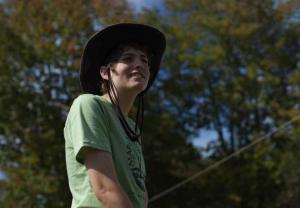 People are saying it feels like the end of the world. But before I talk about the world, I want to talk about Potash Hill, about our home. Because it is still here, even without us. Right now as I record this the trout lilies are blooming, and the wood violets, and the coltsfoot flowers have given way to leaves. Potash Hill—the hemlock trees, the woodpeckers, the quiet stone walls burying themselves in the woods—these things have seen us. The strange crawfish making homes in the fire pond, the rotting apples, the spring mud, that cold sap of the earth—all of these and more have witnessed us, held and beheld us. Some of us for long decades, some only for a semester or two.
People are saying it feels like the end of the world. But before I talk about the world, I want to talk about Potash Hill, about our home. Because it is still here, even without us. Right now as I record this the trout lilies are blooming, and the wood violets, and the coltsfoot flowers have given way to leaves. Potash Hill—the hemlock trees, the woodpeckers, the quiet stone walls burying themselves in the woods—these things have seen us. The strange crawfish making homes in the fire pond, the rotting apples, the spring mud, that cold sap of the earth—all of these and more have witnessed us, held and beheld us. Some of us for long decades, some only for a semester or two.
From the remarks of student speaker Simon Renault MSM ’20 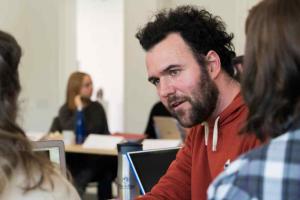 The current crisis teaches us that we will be faced with a lot of unknown. Yet, in that unknown, may lie the truth of who we are as humans. As a species, we instinctively too often run away from the dangerous unpredictability of natural systems to design our own systems: ones we can predict, manipulate and control. And yet, Can we really run away from the messiness of life and being alive on this Earth? We cling to what is and sadly suffer when things fall apart. And yet, let’s together see beyond the ending of things and understand that it is just another iteration of a never ending cycle. Let us embrace aliveness. Let’s push the edges of discovery, together let’s learn to adapt to a life that will, anyway, forever be unpredictable and uncertain.
The current crisis teaches us that we will be faced with a lot of unknown. Yet, in that unknown, may lie the truth of who we are as humans. As a species, we instinctively too often run away from the dangerous unpredictability of natural systems to design our own systems: ones we can predict, manipulate and control. And yet, Can we really run away from the messiness of life and being alive on this Earth? We cling to what is and sadly suffer when things fall apart. And yet, let’s together see beyond the ending of things and understand that it is just another iteration of a never ending cycle. Let us embrace aliveness. Let’s push the edges of discovery, together let’s learn to adapt to a life that will, anyway, forever be unpredictable and uncertain.
From the remarks of faculty speaker Jennifer Girouard ’01 At Marlboro, you accomplished something you didn’t think possible. You came close to giving up but your friends and faculty and staff encouraged you to push through. And now there is this small, hard rock of pride you carry with you. Marlboro is that tiny pebble that you can hold in your palm or place in your pocket as a reminder that you are resilient, that you are capable of big things, and that you will continue to question the world and learn from those around you.
From the valediction by Charlie Hickman ’21 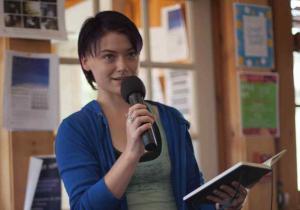 It is my hope that we can all come back together on Potash Hill when it is safe to do so, but I again acknowledge the fact that any future gathering will not repair our loss. I guess that is it, my requisite piece of benedictory advice. Live into the contradiction. Hold the bad with the good, the mess with the beauty, the obstacles with the possibilities, and the ends with the beginnings. I feel so lucky to have been able to experience Marlboro. Not just because of the academic freedom, the governance structure, and the beauty of the campus, but primarily because of this community that continues to astound me. Though this chapter is closing, my wish is that we continue to astound each other and the world.
It is my hope that we can all come back together on Potash Hill when it is safe to do so, but I again acknowledge the fact that any future gathering will not repair our loss. I guess that is it, my requisite piece of benedictory advice. Live into the contradiction. Hold the bad with the good, the mess with the beauty, the obstacles with the possibilities, and the ends with the beginnings. I feel so lucky to have been able to experience Marlboro. Not just because of the academic freedom, the governance structure, and the beauty of the campus, but primarily because of this community that continues to astound me. Though this chapter is closing, my wish is that we continue to astound each other and the world.
For full transcripts of speakers’ comments, as well as the lists of graduates and academic prizes, go to marlboro.edu/comm2020.